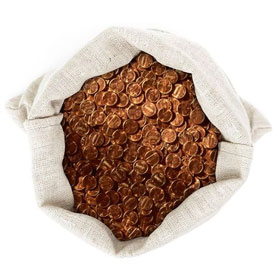Have U.S. Circulating Coins Become A Cruel Joke?
Circulated “legal tender” coins are neither sound money nor even, apparently, legally recognized money in all circumstances anymore.
Because of Federal Reserve inflation, the copper contained in pre-1983 copper pennies is today worth almost 3 cents.
A Colorado judge, Joseph D. Findley, ruled last month that a business owner acted “maliciously and in bad faith” by paying $23,500 in mixed denominations of coins (i.e. pennies, nickels, dimes, and quarters) in one large 6500-pound box to settle a debt with another company.
The final ruling was that the defendant, welding company JMF Enterprises and its owner John Frank, needed to pay the $23,500 in a more convenient way than with coins.
The plaintiff’s attorney claimed the payment in all coins was “petty and a grand waste of time,” “a symbolic middle finger,” and, “a major F-U.”
Without any acknowledgement that federal policy is largely to blame for making America’s currency into a joke, Judge Findley found the payment of coins was “a [harm] tactic aimed at frustrating and undermining the Plaintiff's ability to receive the full benefit of its bargain by making payment so cumbersome and costly as to reduce the net amount of the settlement.”
Perhaps the 6500-pound coin payment was a jerk move by the defendant. Maybe the two companies could have agreed on more specific payment terms and conditions during their mediation proceeding.
Nevertheless, legal tender payment to the exact cent had been given.
Either way, the use of coins as a form of legal payment is acknowledged and supposedly protected by federal law. Section 31 U.S.C. 5103, entitled "Legal tender," states: "United States coins and currency [including Federal Reserve notes and circulating notes of Federal Reserve Banks and national banks] are legal tender for all debts, public charges, taxes, and dues."
Of course, this legal form of payment does not have to be accepted by a merchant or business, and in some cases, even state governments have said they will not accept payment over a certain dollar amount in coins.
In fact, there are a growing number of political activists and politicians who are actively working against the U.S. Mint’s striking of pennies and nickels.
All too often the blame on coins, especially pennies and nickels, is misplaced. This certainly is not the first dispute over payment with coins, and it probably won’t be the last.
The fact that small-denomination coinage is now viewed by many as a nuisance is a reflection of its lost purchasing power. A penny used to be more than enough to buy a piece of candy at a corner store. Now it can’t even buy a candy wrapper.
Congressman Brad Sherman went so far as calling the penny “litter” in remarks on Capitol Hill back in 2018:
I'm going to suggest that you simply abolish the penny. It isn't currency, it's litter. If a police officer saw me throw pennies on the ground, I'd get a ticket for littering, and if I tried to pay that ticket in pennies, the judge would be very upset.
The penny has been our lowest unit of currency since 1857, since Lincoln. Now he wouldn't throw pennies on the ground, and call it litter, because back then a penny was worth more than a dollar is today...
Even 100 years ago, a lump payment in coins would have been perfectly acceptable even though it would have been tedious to count all of them. Since 1923, nearly 1700% in inflation has flowed from our fiat monetary system, and this has caused a shocking devaluation in all U.S. currency denominations and forms of payment.
As of 2023, it takes more than $420,000 to provide the same purchasing power as $23,500 carried in 1923.
Where is the lawsuit that holds the government and the Federal Reserve accountable for the debasement and devaluation of USD that made receiving coins so problematic or troublesome?
Who holds the government accountable for mass inflation that has reduced the penny to the status of litter?
Will there soon be a day when payments in dollar bills, ten-dollar bills, or even one-hundred-dollar bills become as great a burden as payments in coins?
And one final question for you: Got gold?
More By This Author:
Federal Reserve Redoubles Efforts To Reeducate The Young
4 Ways Young People Can Hedge Against Inflation
Coin-Based Trickery: Long-Used Tactics To Rip People Off




